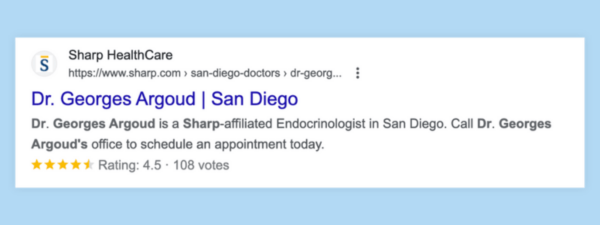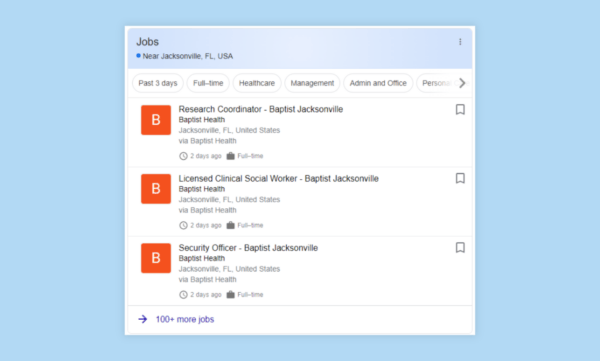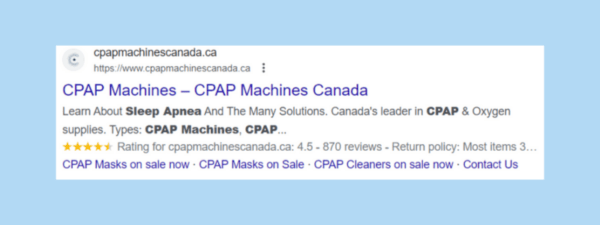Healthcare organizations can improve their SEO performance and stand out competitively in search through Schema Markup. Schema Markup enables the display of vital details in organic search results, including contact information, reviews, locations, operating hours, and more, catering to both current and prospective patients.
Beyond this, implementing Schema Markup can also result in a reusable content knowledge graph for organizations looking to train their internal LLMs, gain a semantic advantage in AI search, and manage their internal data more efficiently.
Let’s take a look at what Schema Markup is and the value it adds to healthcare organizations like yours.
What is Schema Markup?
Schema Markup, also known as structured data, is metadata based on the Schema.org vocabulary that you can add to your website to help search engines better understand and contextualize your web content.
When you implement Schema Markup on your site, you use the Schema.org vocabulary to describe the entities on your web page and how they relate to other entities on your site and across the internet. This helps search engines clearly understand what your web page is about and enables them to provide users with more accurate and relevant search results.
For example, your healthcare organization might have a physician page with content about the physician’s medical specialties, practice location, ratings and reviews, and contact information. When you apply Schema Markup to that page, you express this information in machine-readable format using the Schema.org types and properties. This helps to disambiguate your content topics and support search engine comprehension.
Common Schema Types for Healthcare Providers
In the Schema.org vocabulary, types are how you categorize the various entities on your page, and properties are attributes or characteristics that provide additional details and contextual information about a given entity.
Healthcare organizations can use more general types such as Organization, Physician, MedicalClinic, and more. However, the Schema.org vocabulary contains a Health and Life Sciences extension of over 200 Types and 160 properties specific to the medical space.
These include everything from terms for describing diseases and injuries, such as AnatomicalStructure and MedicalSignOrSymptom, to systems of medicine, such as TraditionalChinese and WesternConventional.
In addition to those listed above, here are some other examples of types of content that you can use to explain information about your healthcare organization:
- MedicalOrganization – Home page
- Hospital – Hospital pages
- IndividualPhysician – Physician pages
- MedicalCondition or MedicalProcedure or MedicalTest– Medical Services pages
The main purpose of implementing Schema Markup is to help search engines understand and contextualize the content on your site. Therefore, it is best practice to choose the most appropriate type and properties that best describe the content on your page.
Download our Definitive Guide to Healthcare Structured Data to develop a comprehensive strategy to start marking up your healthcare pages.
In some cases, adding Schema Markup can also enhance the appearance of a search result on Google’s search engine results page (SERP). This is known as a rich result.
Common Types of Rich Results for Healthcare Providers
A rich result is a visually enhanced and information-rich search result displayed in the SERP, achieved through structured data. Rich results can include star ratings, reviews, and other details, making your healthcare organization’s search appearance more attractive and informative.
Pages with rich results tend to see an increase in click-through rates, higher-quality traffic, and appointments booked, offering measurable results.
Google has specific eligibility and structured data guidelines for each rich result. Aligning your markup with these criteria enhances your chances of achieving various rich results. Here are some common types of rich results that healthcare websites can achieve through structured data.
Review Snippet
Patient engagement is important for any health organization. 94% of healthcare patients leave online reviews about their experiences. Many physician or location pages tend to include reviews and ratings. By nesting the appropriate Schema Markup on your physician or location pages, these pages can achieve a review snippet.
Review Snippets can help organizations display their credibility and build trust during the search journey. When our customer, Sharp Healthcare, achieved Review Snippets for their Physician pages, the CTR for those pages increased by 119%.
Job Posting Rich Results
Hiring talent is top of mind across most healthcare organizations, and Schema Markup provides innovative opportunities around healthcare recruitment.
Healthcare organizations can use Job Posting Rich Results to showcase their job openings directly on Google’s search results, providing key details like job title and location. This boosts visibility, attracts qualified candidates, and streamlines the hiring process.
Our customer, Baptist Health, saw an 1194% increase in CTR when the job posting rich result was awarded.
Product Rich Results
If your healthcare organization sells products such as CPAP machines or flu shots, you can leverage Product Rich Results to display key product information such as price, reviews, and availability directly on the search result.
This provides users with clear and immediate details, which can help them make quick decisions and increase your web conversions.
Recipe Rich Results
If your organization publishes healthy recipes on your site, you can make that content eligible for a Recipe rich result by marking them up with Recipe structured data.
These are just some of the rich result opportunities that healthcare organizations can leverage to stand out in search. However, the value of Schema Markup far exceeds rich results.
Why is Schema Markup Important for Healthcare Providers?
Search engine advancements have transformed the conventional approach to healthcare, with a growing number of patients seeking relevant health-related information directly on the SERP.
Schema Markup is a powerful yet underutilized SEO strategy that can help healthcare organizations stand out in this competitive search landscape and provide answers directly in the search results when prospective patients need it most. Beyond achieving rich results and bringing pertinent information about your organization to the SERP, Schema Markup supports several other healthcare organizations’ SEO initiatives.
Enhanced Search Visibility
Schema Markup helps search engines better understand the content on a healthcare provider’s website. This improved comprehension can lead to higher accuracy in search results. This can improve the provider’s visibility to individuals searching for relevant healthcare information.
Improved Customer Journey
Users can obtain critical details directly from the SERP, including facility location, hours, specialties, and reviews. This fosters transparency, credibility, and trust (contributing to your organization’s E-E-A-T) from the start of their customer journey. The streamlined journey leads to easy navigation to booking pages, reducing steps for user-friendly appointment scheduling.
Develop a Reusable Content Knowledge Graph
By implementing Schema Markup on your site, you can create a reusable content knowledge graph. By doing so, you help generative AI search engines understand and infer knowledge from your content. This content knowledge graph can also be reused to power internal AI initiatives and ground LLMs with accurate information about your organization.
By developing your content knowledge graph, you can control how your brand is understood and presented in search.
The Challenges of Implementing Schema Markup at Scale
Despite all the benefits of implementing Schema Markup for your healthcare organization, creating and implementing a Schema Markup strategy at scale can be costly, complex, and time-consuming.
SEO teams often lack the expertise and the IT resources to deploy and update Schema Markup at scale. That’s where Schema App comes in. At Schema App, we provide an end-to-end, HIPAA-compliant, Schema Markup solution for leading healthcare organizations.
Benefits of Schema App for Healthcare Organizations
1. Measurable Results
One of the best things about Schema Markup is that it is measurable. This makes showing the return on investment from your work with Schema App easy. When you optimize your web pages with Schema Markup and start achieving rich results, Google Search Console reports on the impressions and clicks you achieve specifically from the URLs that are getting these decorated results.
When you start working with Schema App, we ask about your organizational goals and what success looks like from your work with us. We ensure that you have tangible results to show how Schema Markup is contributing to your organization’s goals.
The most common measures are impressions, clicks and click-through rates from rich results achieved on your site. Upon achieving those results, we’ll continue to optimize your Schema Markup strategy and ensure your content evolves with the changing SEO world.
How do you convert clicks to dollars?
If you don’t have a way to correlate clicks or sessions on your website to appointments booked, you can do a simpler calculation by taking your cost-per-click and multiplying it by the number of clicks you get from rich results. The result is the number of dollars you saved from paid advertising through increased organic traffic. Our customers often see an ROI greater than 10X.
# of Clicks from Rich Results X Avg CPC = Value of work done with Schema Markup & Schema App
This allows marketing teams to easily prove the return on investment in their SEO efforts.
2. Retaining Talent through Agility and Scale
In addition to the measurable ROI from clicks, Schema App offers healthcare organizations a return on investment by adding agility to their teams.
Agility is critical to any business’s success. With Schema App, SEO teams no longer need to learn Schema Markup or wait for internal IT teams to update their markup.
Our Schema App Highlighter tool allows SEO teams to generate and deploy dynamic Schema Markup to thousands of similarly templated pages within minutes. Combined with our team of expert Customer Success Managers, SEO teams can access a Schema Markup expert and make updates to their Schema Markup quickly to see results. We aim to ensure we deliver our client’s quarter-over-quarter results with speed and agility.
On top of delivering greater results, staying agile can also help with employee retention. Operational inefficiencies can hold teams back and be demotivating, resulting in lower employee retention. When your team sees their Schema Markup strategies come to life in little to no time, they are empowered by the results, which motivates them to keep performing.
3. Show Value Cross Functionally and to your Physicians
Many of our clients have already tried to do Schema Markup on their own.
SEO specialists spend countless hours trying to learn how to write Schema Markup (JSON-LD) page by page before submitting it to IT to be implemented on the page. With our Schema App Highlighter tool, SEO teams can generate Schema Markup dynamically at scale and deploy it across pages in just a few clicks. They can also reduce their dependency on their development team and get the job done quickly.
Schema Markup not only benefits SEO efforts but also supports physicians within healthcare networks by:
- showcasing reviews and ratings,
- enhancing visibility and appearance on the SERP, and
- building trust with current and prospective patients.
This, in turn, can drive more appointments for these physicians and improve reputability. This can make your physicians more inclined to stay with your healthcare organization, thus aiding physician retention.
Our partnership with Schema App reassures us that this important component of our SEO strategy is being managed. The data we have been able to get out of this is great. Providers love to see how good their marked-up listings look in search results. It’s great evidence of the work we do behind the scenes to increase visibility in our market.”
– Julie Goldstein-Dunn, Director, Experience Insights & Analytics, Henry Ford Health System
Working with Schema App
In the healthcare industry’s competitive landscape, it’s essential to stand out in search results to maintain relevance and visibility among competitors. Integrating innovative strategies like Schema Markup is key to distinguishing your brand. If you haven’t already integrated Schema Markup into your strategy, now is the ideal time to do so, especially as search algorithms increasingly prioritize semantic understanding.
At Schema App, we provide an end-to-end Schema Markup solution. We partner with healthcare networks and other organizations to help their content be better understood by search engines so they can stand out in search. Our aim is to empower organizations like yours to deliver a seamless healthcare experience to their customers with ease and scale.
Are you ready to start getting results from Schema Markup?





